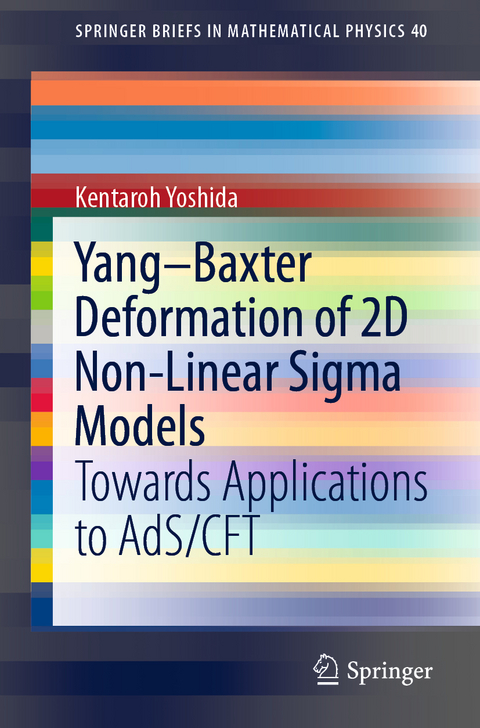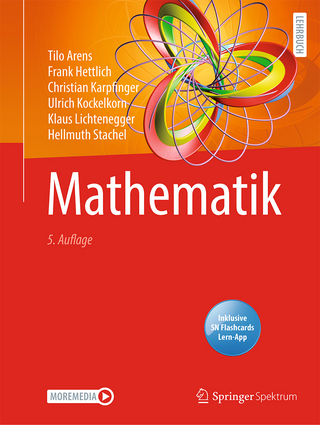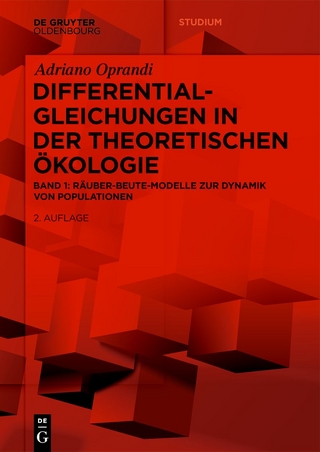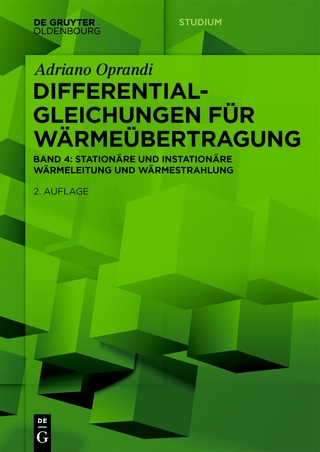
Yang–Baxter Deformation of 2D Non-Linear Sigma Models
Towards Applications to AdS/CFT
Seiten
2021
|
1st ed. 2021
Springer Verlag, Singapore
978-981-16-1702-7 (ISBN)
Springer Verlag, Singapore
978-981-16-1702-7 (ISBN)
There are basically two notions of integrability: classical integrability and quantum integrability. Usually, it is not considered systematic to perform such a deformation, and one must study systems case by case and show the integrability of the deformed systems by constructing the associated Lax pair or action-angle variables.
In mathematical physics, one of the fascinating issues is the study of integrable systems. In particular, non-perturbative techniques that have been developed have triggered significant insight for real physics. There are basically two notions of integrability: classical integrability and quantum integrability. In this book, the focus is on the former, classical integrability. When the system has a finite number of degrees of freedom, it has been well captured by the Arnold–Liouville theorem. However, when the number of degrees of freedom is infinite, as in classical field theories, the integrable structure is enriched profoundly. In fact, the study of classically integrable field theories has a long history and various kinds of techniques, including the classical inverse scattering method, which have been developed so far. In previously published books, these techniques have been collected and well described and are easy to find in traditional, standard textbooks.
One of the intriguing subjects in classically integrable systems is the investigation of deformations preserving integrability. Usually, it is not considered systematic to perform such a deformation, and one must study systems case by case and show the integrability of the deformed systems by constructing the associated Lax pair or action-angle variables.
Recently, a new, systematic method to perform integrable deformations of 2D non-linear sigma models was developed. It was invented by C. Klimcik in 2002, and the integrability of the deformed sigma models was shown in 2008. The original work was done for 2D principal chiral models, but it has been generalized in various directions nowadays. In this book, the recent progress on this Yang–Baxter deformation is described in a pedagogical manner, including some simple examples. Applications of Yang–Baxter deformation to string theory are also described briefly.
In mathematical physics, one of the fascinating issues is the study of integrable systems. In particular, non-perturbative techniques that have been developed have triggered significant insight for real physics. There are basically two notions of integrability: classical integrability and quantum integrability. In this book, the focus is on the former, classical integrability. When the system has a finite number of degrees of freedom, it has been well captured by the Arnold–Liouville theorem. However, when the number of degrees of freedom is infinite, as in classical field theories, the integrable structure is enriched profoundly. In fact, the study of classically integrable field theories has a long history and various kinds of techniques, including the classical inverse scattering method, which have been developed so far. In previously published books, these techniques have been collected and well described and are easy to find in traditional, standard textbooks.
One of the intriguing subjects in classically integrable systems is the investigation of deformations preserving integrability. Usually, it is not considered systematic to perform such a deformation, and one must study systems case by case and show the integrability of the deformed systems by constructing the associated Lax pair or action-angle variables.
Recently, a new, systematic method to perform integrable deformations of 2D non-linear sigma models was developed. It was invented by C. Klimcik in 2002, and the integrability of the deformed sigma models was shown in 2008. The original work was done for 2D principal chiral models, but it has been generalized in various directions nowadays. In this book, the recent progress on this Yang–Baxter deformation is described in a pedagogical manner, including some simple examples. Applications of Yang–Baxter deformation to string theory are also described briefly.
Integrable Non-linear Sigma Models in (1+1)-dimensions.- Yang-Baxter Sigma Models.- Recent Progress on Yang-Baxter Deformation and Generalized Supergravity.
| Erscheinungsdatum | 11.06.2021 |
|---|---|
| Reihe/Serie | SpringerBriefs in Mathematical Physics ; 40 |
| Zusatzinfo | 2 Illustrations, black and white; XII, 70 p. 2 illus. |
| Verlagsort | Singapore |
| Sprache | englisch |
| Maße | 155 x 235 mm |
| Themenwelt | Mathematik / Informatik ► Mathematik ► Analysis |
| Mathematik / Informatik ► Mathematik ► Angewandte Mathematik | |
| Naturwissenschaften ► Physik / Astronomie ► Theoretische Physik | |
| ISBN-10 | 981-16-1702-3 / 9811617023 |
| ISBN-13 | 978-981-16-1702-7 / 9789811617027 |
| Zustand | Neuware |
| Informationen gemäß Produktsicherheitsverordnung (GPSR) | |
| Haben Sie eine Frage zum Produkt? |
Mehr entdecken
aus dem Bereich
aus dem Bereich
Buch | Softcover (2024)
De Gruyter Oldenbourg (Verlag)
59,95 €
Buch | Softcover (2024)
De Gruyter Oldenbourg (Verlag)
59,95 €


